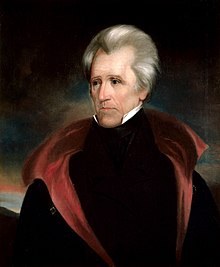
Back Kabinett Jackson German Présidence d'Andrew Jackson French Presidenza di Andrew Jackson Italian Kabinet-Jackson Dutch Президентство Эндрю Джексона Russian
 | |
| Presidency of Andrew Jackson March 4, 1829 – March 4, 1837 | |
| Cabinet | See list |
|---|---|
| Party | Democratic |
| Election | |
| Seat | White House |
|
| |
| ||
|---|---|---|
|
Military career
7th President of the United States
First term
Second term
Post-presidency
Legacy
 |
||
The presidency of Andrew Jackson began on March 4, 1829, when Andrew Jackson was inaugurated as President of the United States, and ended on March 4, 1837. Jackson, the seventh United States president, took office after defeating incumbent President John Quincy Adams in the bitterly contested 1828 presidential election. During the 1828 presidential campaign, Jackson founded the political force that coalesced into the Democratic Party during Jackson's presidency. Jackson won re-election in 1832, defeating National Republican candidate Henry Clay by a wide margin. He was succeeded by his hand-picked successor, Vice President Martin Van Buren, after Van Buren won the 1836 presidential election.
Jackson's presidency saw several important developments in domestic policy. A strong supporter of the removal of Native American tribes from U.S. territory east of the Mississippi River, Jackson began the process of forced relocation known as the "Trail of Tears". He instituted the spoils system for federal government positions, using his patronage powers to build a powerful and united Democratic Party. In response to the nullification crisis, Jackson threatened to send federal soldiers into South Carolina, but the crisis was defused by the passage of the Tariff of 1833. He engaged in a long struggle with the Second Bank of the United States, which he viewed as an anti-democratic bastion of elitism. Jackson emerged triumphant in the "Bank War" and the federal charter of the Second Bank of the United States expired in 1836. The destruction of the bank and Jackson's hard money policies would contribute to the Panic of 1837. Foreign affairs were less eventful than domestic affairs during Jackson's presidency, but Jackson pursued numerous commercial treaties with foreign powers and recognized the independence of the Republic of Texas.
Jackson was the most influential and controversial political figure of the 1830s, and his two terms as president set the tone for the quarter-century era of American public discourse known as the Jacksonian Era. Historian James Sellers has stated that "Andrew Jackson's masterful personality was enough by itself to make him one of the most controversial figures ever to stride across the American stage".[1] His actions encouraged his political opponents to coalesce into the Whig Party, which favored the use of federal power to modernize the economy through support for banking, tariffs on manufactured imports, and internal improvements such as canals and harbors. Of all presidential reputations, Jackson's is perhaps the most difficult to summarize or explain. A generation after his presidency, biographer James Parton found his reputation a mass of contradictions: "he was dictator or democrat, ignoramus or genius, Satan or saint". Thirteen polls of historians and political scientists taken between 1948 and 2009 ranked Jackson always in or near the top ten presidents.[2]
- ^ Sellers 1958, p. 615.
- ^ Feller, Daniel. "Andrew Jackson's Shifting Legacy". Gilder Lehrman Institute of American History. Archived from the original on 22 December 2016. Retrieved 21 December 2016.
© MMXXIII Rich X Search. We shall prevail. All rights reserved. Rich X Search

